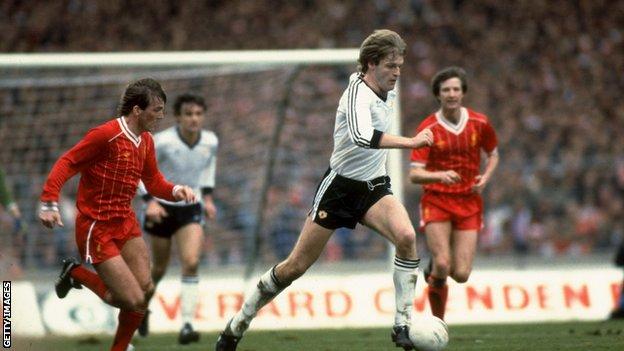Gordon McQueen: Former Scotallnd, Manchester United & Leeds defender diagnosed with dementia
Gordon McQueen #GordonMcQueen

 Gordon McQueen won the FA Cup with Manchester United in 1983
Gordon McQueen won the FA Cup with Manchester United in 1983
Former Scotland, Manchester United and Leeds United defender Gordon McQueen has been diagnosed with vascular dementia, his family have confirmed.
The 68-year-old, whose career began at St Mirren, won the English First Division and FA Cup, earning 30 caps.
McQueen went on to manage Airdrie and coach at Middlesbrough, before working as a television pundit.
His family said in a statement that the former centre-back was formally diagnosed in January.
“As a family we felt it was important to let people know, particularly if raising awareness can help others in similar situations,” they continued.
“Whilst as a family we’ve found it hard to come to terms with the changes in dad, he has no regrets about his career and has lived life to the full.
“He had unforgettable experiences in his playing days with Scotland, Manchester United and Leeds United, and also took so much from his coaching and TV work in more recent times.”
Vascular dementia is estimated by the NHS to affect around 150,000 people in the UK. They say it is caused by reduced blood flow to the brain, and leads to gradual changes and damage to the organ.
The family statement, attributed to McQueen’s wife Yvonne, daughters Hayley and Anna, and son Edward, said that McQueen “wants footballers of today’s generation to know there may be risks with persistent heading of the ball”.
McQueen’s former Leeds team-mate Jack Charlton died with dementia last year and it was confirmed in recent months that Sir Bobby Charlton has been diagnosed with the disease. Three more members of England’s 1966 World Cup-winning squad have also been found to have dementia.
Dr Willie Stewart, the neurosurgeon who led research into football’s links with dementia has warned the issue is “not just for older-era footballers but modern-era footballers as well”.
“Dad scored some important goals in his career and memorable headers but used to stay back in training, heading the ball to the goalkeeper for practice over and over,” said the McQueen family. “He does wonder if this has been a factor in his dementia as his symptoms appeared in his mid-60s.
“He is fully aware of his friends and family still and his memory of all things football is sharp, but his cognitive functions are not the same.
“We don’t want people to be surprised by his condition or continue to ask him for media interviews or autographs which he is not able to do any more.
“Whilst he is looking forward to seeing people again after lockdown and getting the social aspect of life back, we know people will see a big difference in his health so wanted to be transparent.
“We thank everyone in advance for their understanding and hope sharing this news will help dad to face the future in a positive way.”
 Gordon McQueen scored five goals in his 30 international outings
Gordon McQueen scored five goals in his 30 international outings
McQueen moved from Paisley to Elland Road in 1972, winning the English top flight two seasons later and reaching the European Cup final in 1975, where Leeds were beaten by Bayern Munich.
He joined Manchester United in 1978, claiming the FA Cup five years later, before finishing his career at Hong Kong side Seiko SA.
The defender scored five goals in his 30 Scotland appearances, and was inducted into the Scottish Football Hall of Fame in 2012.
The Football Association is currently supporting two independently led research studies examining former professional players for early signs of neurocognitive degeneration.
The FOCUS study by the University of Nottingham is being funded by the FA and Professional Footballers’ Association, while the HEADING study by the London School of Hygiene & Tropical Medicine is being funded by the Drake Foundation.